

BETA CHRONICLES
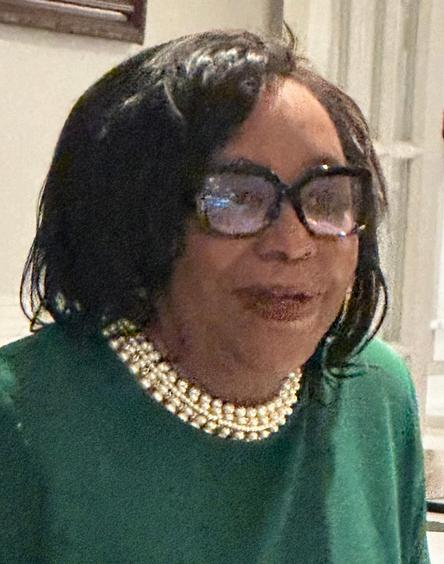
PRESIDENT’S MESSAGE
Dear Sorors and Friends,
Happy New Year and welcome back to our Winter-Spring issue! I hope this message finds you warmed by the spirit of the season and ready to embrace the exciting opportunities ahead.
As we reflect on our recent activities, I am thrilled to share that we had the pleasure of celebrating the holidays with the wonderful residents of Faith Manor Senior Residence The joy of giving back during this season truly enriched our hearts. Additionally, we welcomed the New Year with the spirited residents of St Monica’s Elderly Housing, sharing laughter and fellowship that set a positive tone for the months to come.
January honored the legacy of Dr. Martin Luther King Jr., a reminder of our commitment to service and advocacy. Throughout February, we celebrated Black History Month by acknowledging the remarkable contributions of African Americans in Connecticut who have made significant strides in their chosen professions, reminding us all of the endless potential within our own ranks
I am also excited to share that our chapter is in the early stages of building a website that will serve as a valuable resource and point of connection for our members. We aim to roll it out soon, providing a centralized location for updates, events, and member engagement Additionally, we are in the planning phases for a magazine that will address some of our tech needs and enhance our understanding of technology in today’s world
Our members have been actively participating in the Eastern Region's Chat & Grow, further strengthening our bond with sorors across the region. These engagements provide us with invaluable opportunities to share knowledge, collaborate on projects, and uplift one another.
As we move forward into this new season, let us continue to support each other, celebrate our achievements, and remain committed to the values that unite us. Together, we can make a significant impact in our community and beyond.
In sisterhood and service,
Joyce Balfour, Beta Chapter President

BETA CHRONICLES
Sorors were in a festive mood.
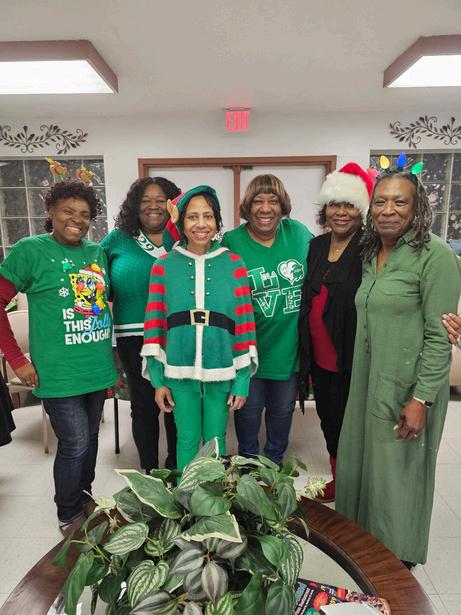
SENIORS CELEBRATE AT FAITH MANOR ELDERLY HOUSING
HAPPY HOLIDAYS!
2024 Seniors Christmas Party
The Beta Chapter proudly celebrated the holiday season with the seniors at Faith Manor

Elderly Housing, continuing a cherished tradition that has lasted for over thirty years.
After a challenging period during the pandemic, when the chapter members had to deliver gifts without personal interaction, this year's event marked a joyous return to inperson festivities.
On Sunday December 8th, 2024 the chapter provided a delightful spread of food, lively music, engaging games, and thoughtful presents for all residents. The atmosphere was filled with laughter and camaraderie as everyone participated in the fun activities. Prizes were awarded during games, adding to the excitement.
The celebration culminated in a heartfelt singing of Christmas carols, bringing joy and warmth to all attendees. The event was not only a chance to share the holiday spirit but also to reconnect and cherish the bonds formed over the years.
Here's to many more years of joy and celebration with our beloved seniors!

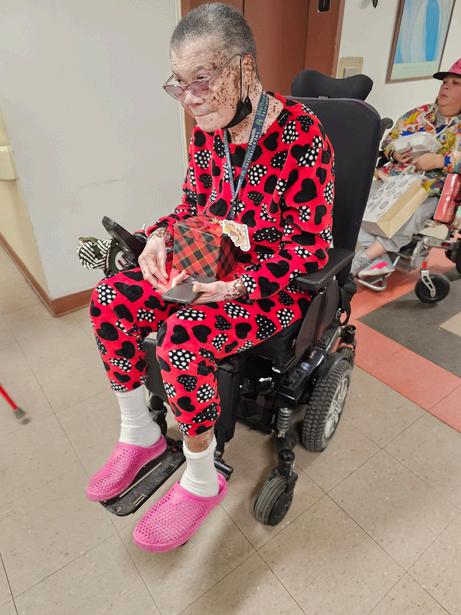
Residents of
Faith Manor
Senior Housing
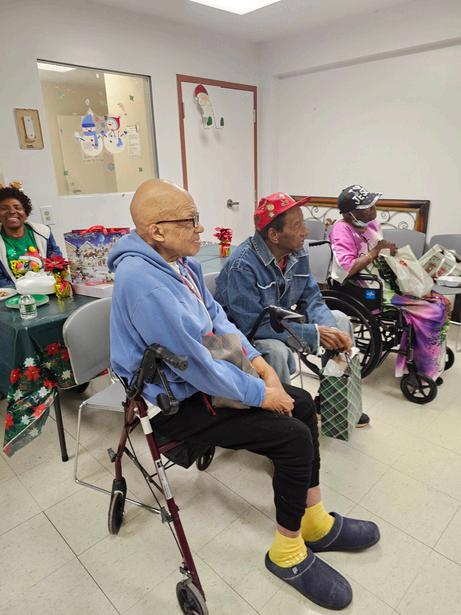





On January 5th, 2025, Beta Chapter members , along with the Men of Iota (MOIs) and the wonderful residents of St. Monica’s Senior Housing, gathered to celebrate the New Year with a delightful event filled with camaraderie, games, and music
The atmosphere was lively and joyful as participants enjoyed a variety of engaging games, fostering connections and laughter among attendees. Refreshments were served, and a variety of treats added to the festive spirit.
Generous prizes were awarded, courtesy of the Beta Chapter, adding an extra layer of excitement to the occasion.
RINGING IN THE NEW YEAR WITH THE SENIORS AT ST. MONICA’S SENIOR CENTER
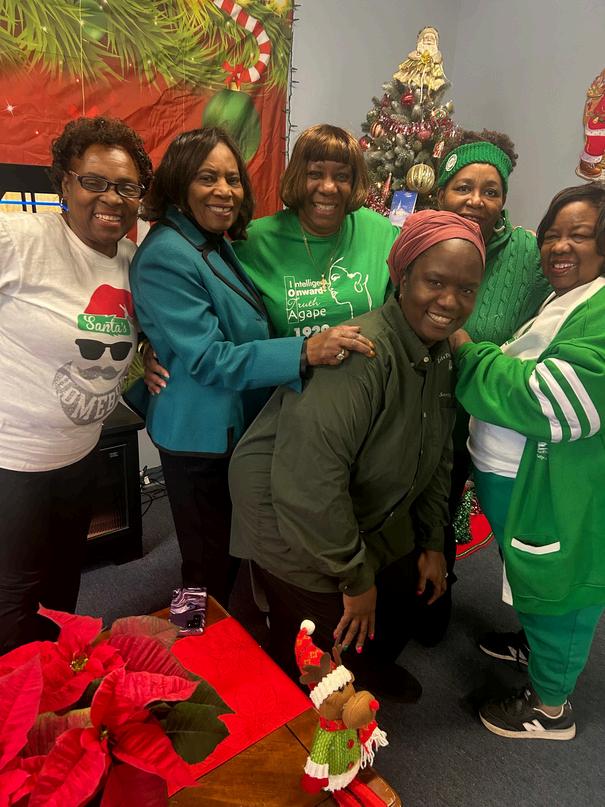

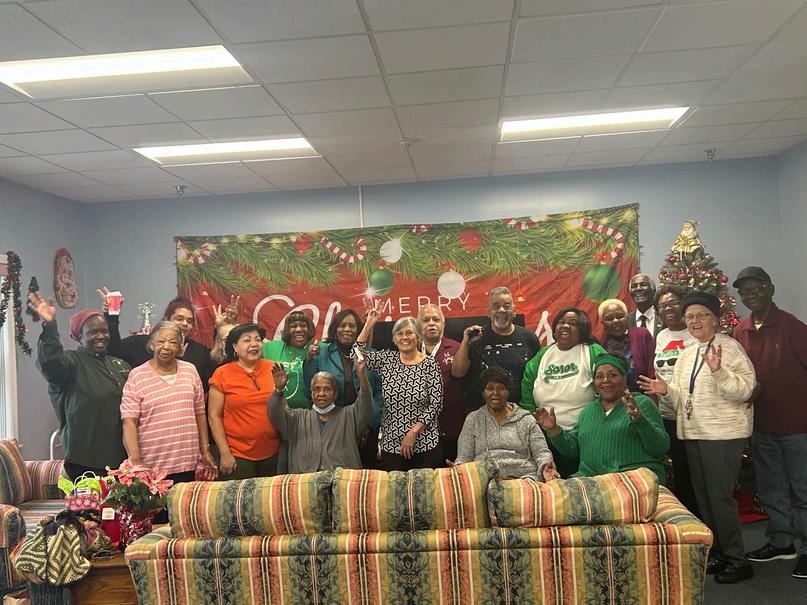
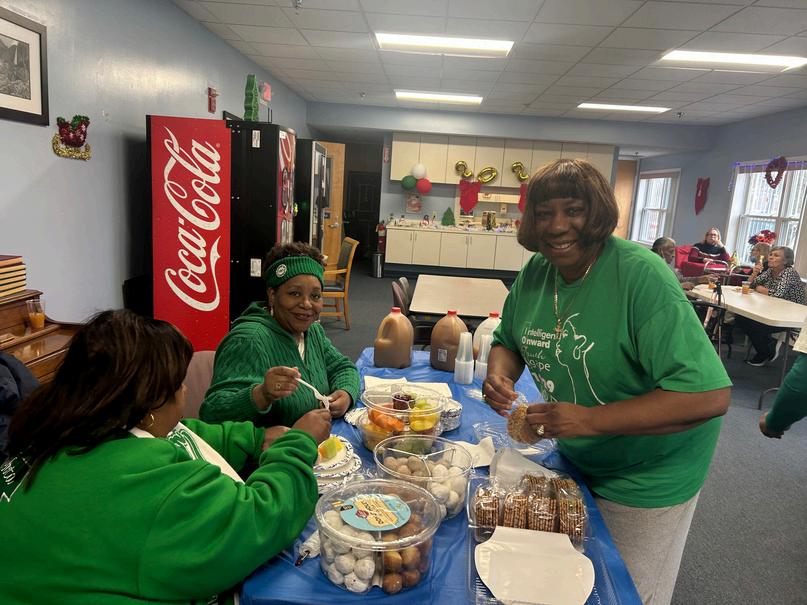
The celebration was a wonderful way to ring in the New Year, as everyone came together to create lasting memories. Here’s to a prosperous and joyful 2025 ahead!
CELEBRATING THE REVEREND DR. MARTIN LUTHER KING DAY
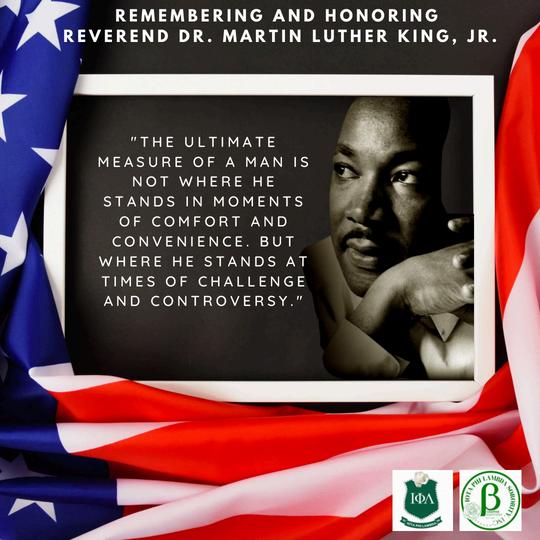
On a cold wintry day, January 18, 2025, members of Beta Chapter attended local celebrations to honor the legacy of the late Reverend Dr. Martin Luther King Jr.
The events sponsored by the Towns of Bloomfield and Simsbury brought together community members, leaders, and organizations to reflect on Dr. King’s profound impact on civil rights and social justice. Despite the chilly weather, the spirit of unity and purpose was palpable, as participants engaged in meaningful discussions, activities, and tributes that celebrated Dr. King's vision of equality and peace.
Beta Chapter members were proud to be part of this important occasion, contributing to the day's events and honoring the values Dr. King stood for compassion, integrity, and community service.
As the celebrations unfolded, the chapter's involvement underscored their commitment to uplifting the community and fostering the ideals that Dr. King championed. Together, attendees were reminded of the ongoing work needed to continue advancing justice and equality for all.
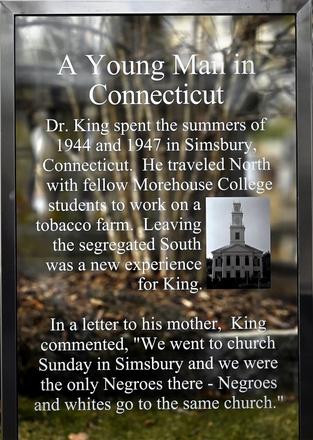
MARTIN LUTHER KING, JR. MEMORIAL
The Martin Luther King Jr. Memorial in Simsbury, Connecticut, serves as a tribute to Dr. King's formative experiences in the area during his youth. While attending Morehouse College, he spent time working in the local tobacco fields, which played a significant role in shaping his understanding of social justice and equality. This memorial not only honors Dr. King's legacy but also highlights the historical connection between his early life and the town of Simsbury.
AFRICAN AMERICANS: MAJOR CONTRIBUTORS TO LABOR IN THE UNITED STATES

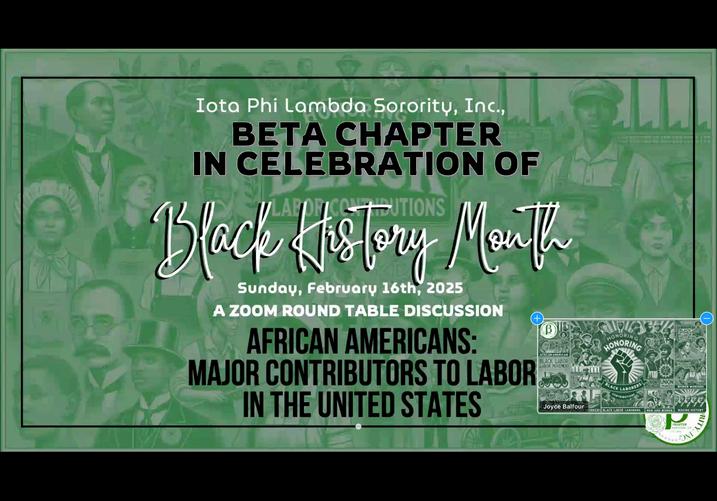
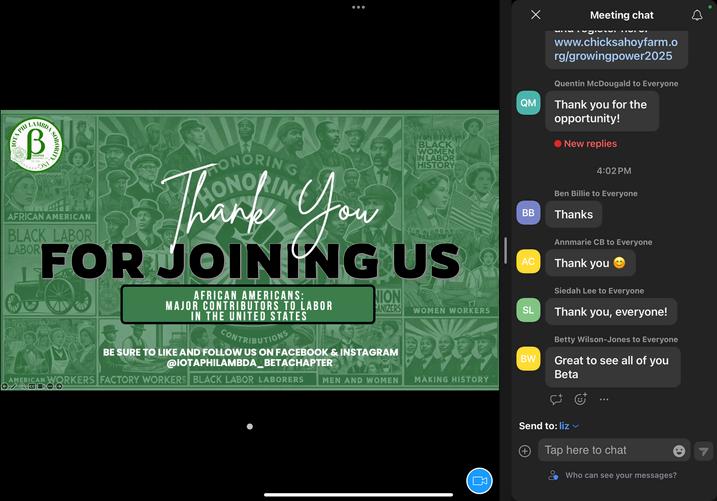
BLACK HISTORY MONTH PROGRAM
On Sunday, February 16, 2025, in celebration of Black History Month, the Beta Chapter presented a Zoom roundtable discussion themed "African Americans: Major Contributions to Labor in the United States." The panelists consisted of Mr. Lorenzo Jones, Co-Founder and Co-Executive Director of the KATAL Center for Equity, Health, and Justice; Mr. and Mrs. Victor and Karen Lawson, Founder and CEO of Lawson Power Source, LLC; and Mr. Quentin McDougald, Founder of Nothing But Web, LLC. The City of Hartford's Legislative Aide, Ms. Siedah Lee, served as the moderator and Soror Pamela Applewhite-Miller was the Mistress of Ceremonies
The theme of this event recognized the significant role that Black labor has played in the history of the United States. Its purpose was to highlight how work has been central to the Black American experience, and it sought to honor the remarkable contributions of distinguished panelists and to celebrate the resilience, strength, and ingenuity that have defined their journeys.
The Zoom event was a notable success, drawing over fifty attendees, including supportive sorors from sister chapters, which highlighted the strong sense of community and

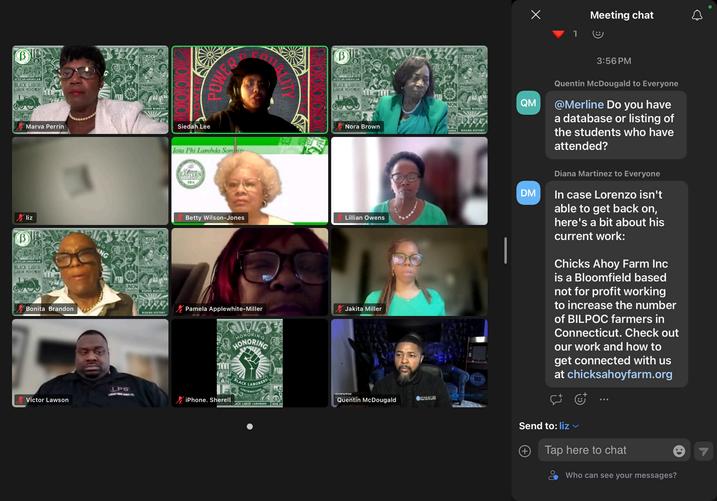
Black History Month Program Cont’d…
collaboration among the participants. Despite the occasional technical glitch that prevented the audience from hearing Mr. Lorenzo Jones, the other panelists made the most of the opportunity by sharing their personal stories and experiences related to starting their own businesses. These narratives added depth to the discussion and provided valuable insights into the entrepreneurial journey for Black individuals.
Mr. Lorenzo Jones had a significant message prepared, focusing on promoting justice and health fairness, as well as the importance of community involvement in effecting lasting change, particularly regarding the farming experiences of African
Americans. His perspective was missed during the event, but the chapter recognized his important contributions and intentions, leading to a decision to invite him back for a future function. This follow-up will allow for the sharing of his insights and the continuation of the vital conversation around justice, community involvement, and the experiences that shape Black entrepreneurship.
The event featuring Mr. Lawson and Mr. McDougald was a significant gathering that highlighted critical issues surrounding Black entrepreneurship and the digital divide. Mr. Lawson’s insights into the challenges faced by Black business owners shed light on the systemic barriers that often marginalize these entrepreneurs, while Mr. McDougald’s passion for technology and education underscored the importance of equipping young Black individuals with the tools necessary for success in a rapidly evolving job market.
The questions from the audience demonstrated a strong commitment to understanding how to better support Black labor initiatives and create equitable opportunities across various sectors. This lively exchange of ideas allowed participants to learn from the panelists' experiences and engage in meaningful discussions about potential solutions and strategies to address the pressing challenges faced by the Black community in business and education

Black History Month Program
Cont’d…
Mrs . Pamela Applewhite-Miller, Mistress of Ceremonies
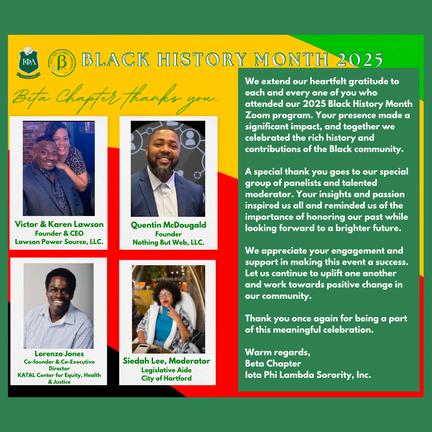
The event served as an important platform for sharing knowledge and fostering collaboration toward a more inclusive future.
The conclusion of the event, led by Ms Siedah Lee, was a powerful reminder of the importance of continuous dialogue around labor rights and equity, especially in the context of Black History Month. Her call to action encouraged attendees to carry forward the discussions raised during the event, fostering a community committed to advocating for social and economic justice.
On behalf of Beta Chapter, Soror Applewhite-Miller's expression of gratitude highlighted the collaborative effort required to make such events successful, acknowledging the invaluable contributions of the panelists, guests, and volunteers.
Ending the gathering with a recitation of a poem by Nikki Giovanni added a profound artistic touch, allowing reflections on the themes of the day. This Zoom roundtable not only celebrated Black history but also aimed to inspire participants to become active advocates for change. It served as a poignant reminder that the pursuit of equality in labor is an ongoing journey, where every voice matters in the collective fight for justice. The event indeed set the stage for further engagement and action in support of these essential initiatives.
FEBRUARY IS NATIONAL CANCER PREVENTION MONTH
February is recognized as National Cancer Prevention Month, a vital time to raise awareness about cancer prevention strategies and to emphasize the importance of early detection and healthy lifestyle choices. For Black women, this month holds particular significance due to the disparities in cancer rates and the unique challenges they face in accessing quality healthcare.
Data indicates that Black women experience higher rates of certain cancers compared to women of other racial/ethnic backgrounds. For instance, breast cancer is the most common cancer among Black women, and while they are less likely to be diagnosed with breast cancer than white women, they are more likely to die from the disease. Additionally, Black women are disproportionately affected by cervical cancer and have higher mortality rates from endometrial cancer. According to the American Cancer Society, Black women have a 41% higher rate of dying from breast cancer compared to white women.
Several barriers contribute to these alarming statistics. Access to healthcare is a significant issue, with many Black women facing socioeconomic challenges that limit their ability to receive regular screenings and preventative care. These obstacles can include lack of health insurance, transportation issues, and systemic racism within the healthcare system, which can lead to mistrust and disparities in treatment.
Moreover, cultural factors and health literacy play a role in how health information is received and acted upon. There is often a lack of targeted educational resources that resonate with the unique experiences of Black women. This can lead to delays in diagnosis and treatment, exacerbating health disparities.
To combat these challenges, a multi-faceted approach is necessary. Here are some strategies that can help increase awareness and improve access to healthcare resources for Black women:
1. Community Education and Outreach: Organizations can host workshops, seminars, and health fairs that focus on cancer prevention and screening. Providing culturally relevant materials and engaging community leaders can enhance outreach efforts.
February is National Cancer Prevention Month Cont’d…
2. Partnerships with Local Healthcare Providers: Collaborating with healthcare providers to offer free or low-cost screenings, especially in underserved areas, can help increase early detection rates.
3. Use of Technology: Mobile health applications and social media campaigns can spread awareness and provide information on cancer prevention, resources, and support groups tailored to Black women.
4. Support Groups and Peer Education: Establishing peer-led support groups can create safe spaces for Black women to share their experiences and learn from one another, fostering a sense of community and empowerment
In the greater Hartford area, several organizations are dedicated to supporting cancer prevention among Black women. One notable initiative is The Hartford HealthCare Cancer Institute, which provides comprehensive cancer care and hosts community outreach programs aimed at educating women about prevention and early detection.
Additionally, The Connecticut Cancer Partnership works to reduce cancer disparities through community engagement and education. They focus on empowering communities, including Black women, by providing resources and support for cancer prevention efforts.
Organizations like Sisters' Journey offer support specifically for women of color facing cancer, creating a network of support and information that can help navigate the challenges of prevention and treatment.
National Cancer Prevention Month serves as a crucial reminder of the ongoing need for awareness and action, especially for Black women who face disproportionate cancer risks. By addressing barriers to care and fostering community initiatives, we can work towards reducing disparities and promoting healthier outcomes for Black women in the fight against cancer. Together, we can build a future where every woman has access to the resources needed for prevention and early detection, ultimately saving lives and fostering a healthier community.
MARCH IS WOMEN’S HISTORY MONTH
As we celebrate Women’s History Month in 2025, it is essential to honor the achievements of women across all walks of life while also acknowledging the pressing health issues that disproportionately affect them. This year, one of the most significant health concerns plaguing women, particularly African American women, is cardiovascular disease.
Cardiovascular disease remains a leading cause of death among women in the United States. According to the American Heart Association, nearly 1 in 3 women die from heart disease, making it more deadly than all forms of cancer combined This issue is even more critical for African American women, who face a higher risk of heart disease due to a combination of genetic, socioeconomic, and environmental factors.
Statistics reveal that African American women are 60% more likely to have high blood pressure and are more prone to obesity and diabetes—two significant risk factors for cardiovascular disease. Furthermore, racial disparities in healthcare access often lead to late diagnoses and inadequate treatment for these conditions.
Addressing the Issue: Suggestions for Overcoming Health Challenges
1. Regular Health Screenings: Women should prioritize regular health check-ups, including blood pressure monitoring, cholesterol checks, and diabetic screenings. Early detection is crucial for effective management of risk factors.
2. Healthy Lifestyle Choices: Encouraging a balanced diet rich in fruits, vegetables, whole grains, lean proteins, and healthy fats can significantly reduce the risk of cardiovascular disease. Regular physical activity, aiming for at least 150 minutes of moderate exercise weekly, is equally important.
3. Mental Health Awareness: Stress management and mental health awareness play a vital role in overall health. Women should seek support from mental health professionals, engage in mindfulness practices, and develop strong support networks.
4. Health Education and Advocacy: Increasing awareness about heart health and providing educational resources can empower women. Community workshops and informational campaigns can effectively disseminate this knowledge.
March is Women’s History Month Cont’d…
Advocacy for Women’s Health Issues
As a collective, we can advocate for women's health issues by:
1. Supporting Policy Changes: Urging legislators to prioritize women's health initiatives, including funding for research and community health programs focused on cardiovascular health.
2. Community Involvement: Engaging in local health fairs and workshops to provide resources and information directly to women in underserved communities, particularly African American women.
3. Utilizing Social Media: Leveraging social media platforms to raise awareness about the importance of heart health, share personal stories, and promote community events dedicated to women's health.
4. Coalition Building: Forming partnerships with organizations focused on women’s health can amplify our advocacy efforts Working together increases resources and outreach capabilities.
In conclusion, as we celebrate Women’s History Month, let us not only recognize the achievements of women throughout history but also commit to addressing the pressing health issues that continue to impact women today By fostering awareness, encouraging healthy lifestyle work together to overcome these challenge .
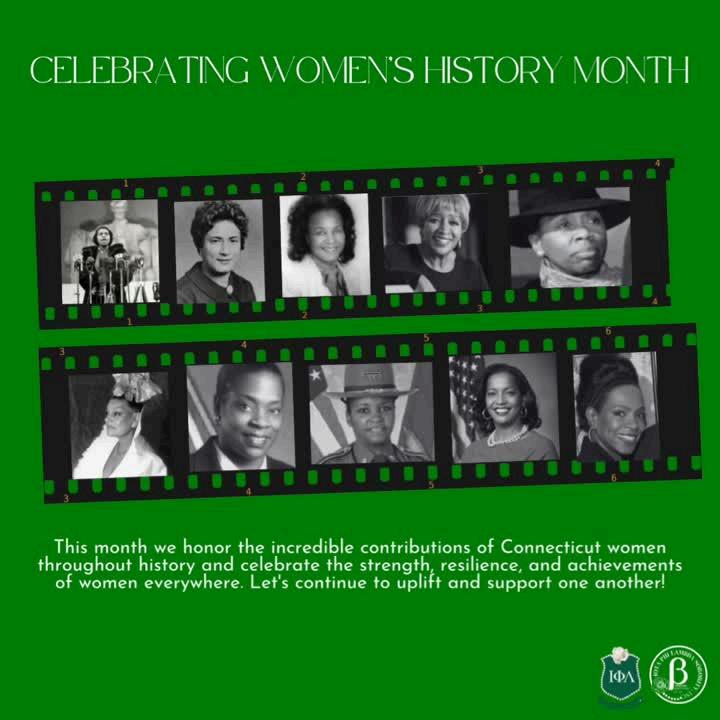

DID YOU KNOW??
CONGRATULATIONS…
TO SOROR DR. GERALDINE MCHUGH-WILLIAMS ON ATTAINING HER DOCTORATE. “HARD WORK PAYS OFF”.

COMING SOON…
CHECK US OUT ON…

